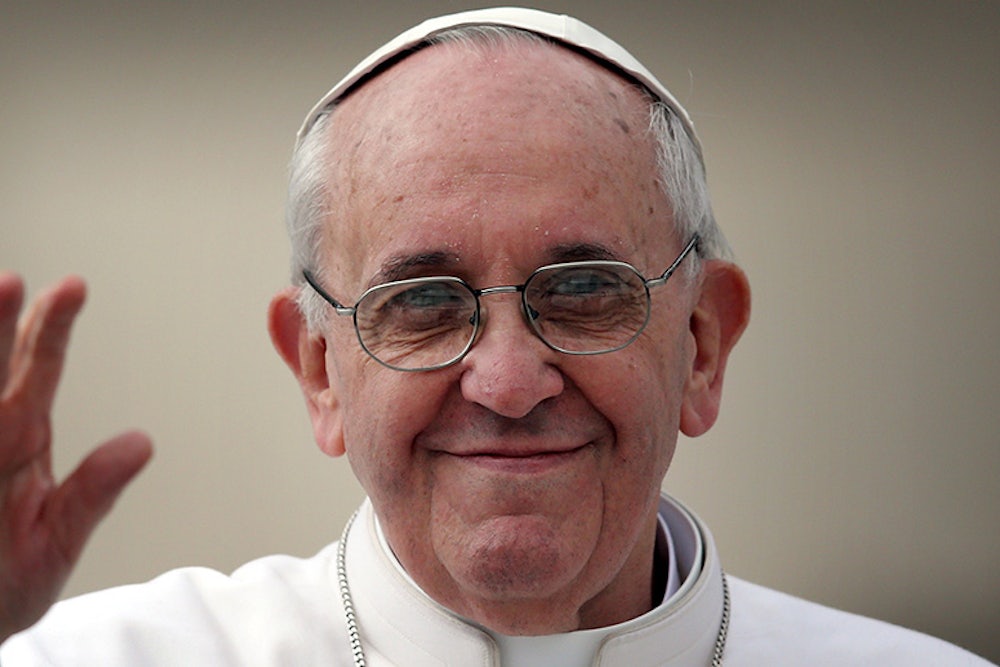When Pope Francis speaks about inequality, as he does frequently—and most recently Friday in an address to several United Nations agency heads in Rome—liberals and conservatives gather and, like the blind men with the elephant, claim that the singular thing he has just said means completely different things. (Author Elizabeth Stoker has fashioned another analogy: a Bingo card. Which parts of Francis’ remarks did you hear?)
What did Francis say Friday? He condemned the “economy of exclusion,” according to the Associated Press. He called for “worldwide ethical mobilization” with the poor. He cited “the legitimate redistribution of economic benefits by the state, as well as indispensable cooperation between the private sector and civil society” as ways to combat poverty. “Francis urged the U.N. to promote development goals that attack the root causes of poverty and hunger, protect the environment and ensure dignified labor for all,” the AP reported, quoting him saying, “Specifically, this involves challenging all forms of injustices and resisting the economy of exclusion, the throwaway culture and the culture of death which nowadays sadly risk becoming passively accepted.” Yes, “culture of death,” for Francis also spoke of life “from conception to natural death.”
In other words: raise taxes on the rich, make government better, and keep Terri Schiavo on life support.
Of course, it’s not remotely that simple. Yet the stakes couldn’t be higher: More than one billion people worldwide are ostensibly supposed to believe this man is literally infallible (though not most of the time, but you get the idea). And many more billions seem inclined to see the Pope as a moral beacon regardless of their religious beliefs. And so we fight over what the he said like dogs over a scrap of meat.
On the one hand, there is this MSNBC article. Headline: “Pope Francis Calls For Wealth Redistribution.” It was, according to the reporter, “one of the most economically liberal statements made by any Pope.” It contextualized the remarks in Francis’ broader progressive agenda, citing his “bold statements on LGBT equality and sex abuse in the Roman Catholic Church” (as well as the 900 recently defrocked priests). And the “culture of death” phrase isn’t mentioned.
And then on the right, there were posts on both The National Review's Corner blog and at TheBlaze. It’s hard to take The Corner’s seriously, since it alleges that the AP piece left out the “culture of death” mention, which, well, it didn’t. The author also doesn’t engage at all with the inequality message, much as MSNBC doesn’t engage with the “culture of death.”
Far better is TheBlaze post (Glenn Beck 1, William F. Buckley, Jr. 0). It earnestly reports Francis’ comments on the economy. And it clarifies, accurately: “The pope has denied he’s Marxist and spent years in Argentina battling Marxist excesses of liberation theology.”
Most intriguing, though, is the post’s final sentence: “He has said from the outset, though, that he wants a church that ‘is poor and for the poor’ and ministers to the most marginal of society—a common theme in Christian circles and theology.”
I doubt Francis is particularly engaged with the debate over inequality in the Democratic Party, or in the United States. I would not guess he knows how to calculate a Gini coefficient. Heaven help us (literally, I guess) if he ever mentions Thomas Piketty. What Francis is, obviously, is extremely knowledgeable and authoritative on the Catholic tradition of social justice as well as the Catholic tradition of the “culture of life,” which, in Catholic teaching, are two intimately interconnected things.
But what is so fascinating about this Pope is the way in which he is received here. What has happened, I think, is that Catholic social-justice teaching has simply intersected with an independent zeitgeist more neatly than it ever has before. And this has illustrated an underrated aspect of all the talk about inequality: That it isn’t just a left-wing concern. Reformist Republicans like Ross Douthat and Kay Hymowitz have different solutions to inequality than the left, but they believe it real and think it should be addressed, too. And Tea Party leaders frankly address inequality, too. Contrary to what President Barack Obama famously orated ten years ago, there is a Red America and a Blue America. But increasingly the more relevant Two Americas are the Haves and the Have-Nots.
